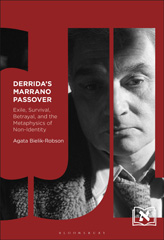2022 - Bloomsbury Publishing
E-book
Digital Version
Lectura en streaming | NO Descarga | NO Copiar/pegar | NO Impresión
Derrida's Marrano Passover
296 p.
- In this first ever monograph on Jacques Derrida's 'Toledo confession' - where he portrayed himself as 'sort of a Marrano of the French Catholic culture' - Agata Bielik-Robson shows Derrida's marranismo to be a literary experiment of auto-fiction. She looks at all possible aspects of Derrida's Marrano identification in order to demonstrate that it ultimately constitutes a trope of non-identitarian evasion that permeates all his works: just as Marranos cannot be characterized as either Jewish or Christian, so is Derrida's 'universal Marranism' an invitation to think philosophically, politically and - last but not least - metaphysically without rigid categories of identity and belonging.By concentrating on Derrida's deliberate choice of marranismo, Bielik-Robson shows that it penetrates deep into the very core of his late thinking, constantly drawing on the literary works of Kafka, Celan, Joyce, Cixous and Valéry, and throws a new light on his early works, most of all: Of Grammatology, Dissemination and 'Différa
- nce'. She also offers a completely new interpretation of many of Derrida's works only seemingly non-related to the Marrano issue, like Glas, Given Time: Counterfeit Money, Death Penalty Seminar, and Specters of Marx. In these new readings, this book demonstrates that the Marrano Derrida is not a marginal auto-biographical figure overshadowed by Derrida the Philosopher: it is one and the same thinker who discovered marranismo as a literary trope of openness, offering up a new genre of philosophical story-telling which centers around Derrida's Marrano 'auto-fable'. [Publisher's text].
- Special access authorizations may apply; please contact us for further information.
-
Información
ISBN: 9781501392627
COLECCIÓN


